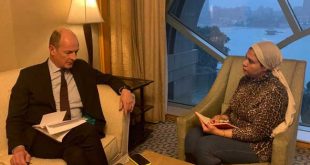Doaa Moneim – Ahram Online
At ‘EDEX-21’, Ahram Online interviewed Boeing’s Vice President for Business Development, Defence, Space and Security in the Middle East, North Africa and Turkey, Rick Lamester on the future of the aviation industry amid the ongoing pandemic. The discussion covered the new products and technologies Boeing is showcasing at the four-day event.
How do you think Boeing can benefit from EDEX?
First, we would like to extend our congratulations to the Egyptian Armed Forces and all Egyptian citizens on a successful EDEX 2021.
This show presents Boeing with an opportunity to showcase our latest capabilities, technologies and services offered across land, sea, and aerospace for customers in Egypt and across the Middle East.
Through our various programmes on display this week at EDEX, Boeing is able to demonstrate its commitment to supporting the region’s security requirements and considerable potential for growth.
Secondly, meetings with customers at the Egyptian Air force Symposium a day prior to EDEX and at the exhibition gave us the opportunity to sit down with our customers face to face. We were able to listen to their needs and concerns in a way that was difficult over telecons and Zoom calls over the past year and half. We value these relationships and are pleased they remain ready to help despite the trials of COVID-19.
Which products and technologies Boeing is showcasing at the EDEX can support Egypt’s defence and security sector?
Boeing will be discussing capabilities of interest and future needs for the region with customers and sharing new capabilities which Boeing brings to the market with platforms such as AH-64 Apache, CH-47 Chinook, KC-46, F-15EX, T-7, Integrator ER, and Wave Glider, as well as our Boeing Global Services portfolio with sustenance, modernisation and upgrades.
We look forward to having discussions with our partners and our customers on their current and future defence and security needs of the region. And how Boeing can offer the right capabilities, infrastructure and services at the right time.
What are Boeing’s main cornerstones of its defence cooperation with Egypt and are there any future plans?
The Middle East region and Egypt are of strategic importance to us in terms of growth, partnership, investment and presence. With Egypt in particular, we are so proud of our six decades long-standing relationship. In 1979, the partnership extended to the Egyptian military when they inducted F-4 Phantom IIs. Since then, Egypt has operated Boeing products including Apache and Chinook helicopters, the Avenger short-range air defence system, Harpoon missile systems as well as the Harpoon Joint Common Test set.
It has been very impressive to see how Egypt has used its upgraded CH-47 Chinook fleet for humanitarian assistance and disaster relief operations inside and outside its borders, including sending two Egyptian Air Force Chinook helicopters to Greece to take part in firefighting efforts there. It’s a matter of pride for us at Boeing to see our products having a positive impact around the world and Egypt remains a valued member of the worldwide Apache and Chinook family. It has also been impressive to see how the Egyptian Air Force has made investments over the years to upgrade its military capabilities for its National security and protecting its border.
Over the past four decades, Boeing has stood alongside Egypt along with our other customers and remain committed to supporting all of you with technologically advanced, proven and innovative products and services now and in the future, as they look to next generation programs and support solutions.
Over the next five years, Boeing BDS’s total opportunities will reach $170 Billion across 41 countries in international defence and services. So, what is the situation for Egypt in this regard?
The global defence market has been resilient with enduring demand for major programs and remains relatively strong and stable as compared to the challenges faced by the commercial aerospace market. For the long term, of the $2.6 Trillion global defence and space market we project over the next 10 years, about 40% of expenditures are expected to originate outside of the United States. Demand for government services is similarly robust at $1.5 Trillion, driven by both US and international military aircraft fleet expansions.
As we begin to emerge from the pandemic, we’ve taken the time to really consider our global customers’ needs and have refreshed our business strategy.
Here in the Middle East, we’re seeing strong demand for fighters, vertical lift and attack helicopter portfolio, autonomous systems and KC-46, both on the platform side and product support side. We’ve been in discussions with our armed forces customers in different countries about their existing and future capabilities, as well as the specific outcome they are driving toward when it comes to fleet operations and readiness.
How does Boeing perceive the defence industry scene in the Middle East now and over the medium-term, especially with regards to the pandemic?
The pandemic has impacted all of us in deep and personal ways. While it is easing in some places of the world, all of us are very much aware that we will be impacted for a longer time. In this environment, Boeing remains committed to doing all we can to helping the world continue to weather the pandemic safely.
From a business perspective, increased government spending on COVID-19 is adding pressure on defence budgets in some countries, while others are increasing spending on their security.






